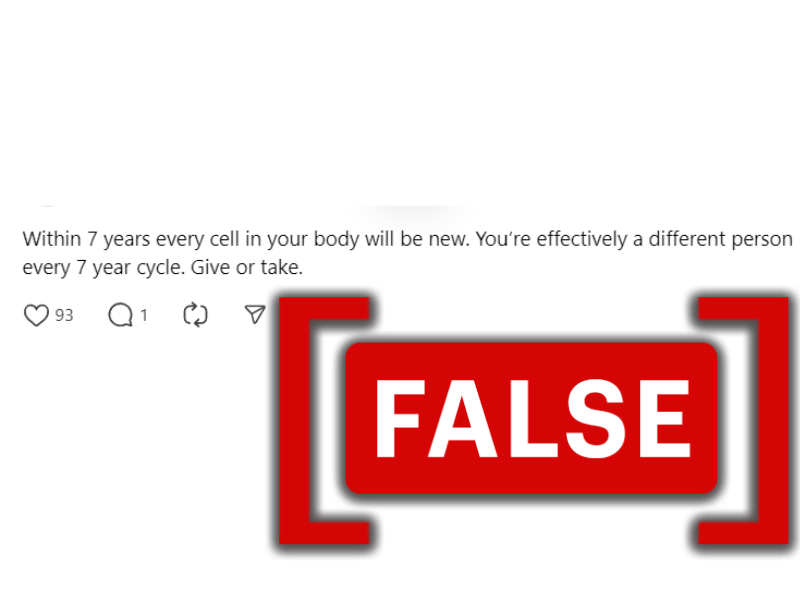By: Emilia Stankeviciute
September 23 2024
 Sreenshot of the claim on Threads. (Source: Threads/Modified by Logically)
Sreenshot of the claim on Threads. (Source: Threads/Modified by Logically)
The body doesn't fully renew every 7 years. Some cells regenerate, but others, like brain neurons, don't, and aging progresses as damage accumulates.
Context
The false claim that every cell in the human body completely renews itself every seven years recently resurfaced in a Threads discussion about "creepy" facts related to the human body.
The statement (archived here) has amassed 2,485 views and over 90 likes.
The idea is not supported by scientific evidence and oversimplifies the complex processes of cellular regeneration and human biology.
In fact
Cellular regeneration varies greatly depending on the cell type, and no universal timeline exists for the regeneration of the entire body. Some cells, such as skin cells, renew rapidly—every two to four weeks—due to constant exposure to external elements. Red blood cells have a lifespan of approximately 120 days, while bones take about ten years to regenerate fully.
On the other hand, specific cells, such as neurons in the cerebral cortex, which are responsible for essential functions such as memory and cognition, last a lifetime without regeneration.
This data is sourced from BioNumbers, a scientific database supported by institutions including Harvard Medical School, which ensures its information is backed by peer-reviewed studies.
.png)
While certain tissues, such as the liver, have regenerative abilities, even this organ does not follow the simplistic "seven-year rule." According to the study published in the International Journal of Molecular Sciences, the liver's ability to heal depends on the extent of damage and involves processes like cell division, signaling pathways, and tissue repair.
However, the ability of certain organs to regenerate does not negate the fact that many parts of the body age and degrade over time due to cumulative DNA mutations, cell damage, and environmental stress.
Verdict
The claim that the human body completely renews itself every seven years is an incorrect oversimplification. While many cells in the body regenerate, the rates vary drastically depending on the type of cell, and some cells, such as neurons in the brain, never regenerate at all.
Far from becoming a "new person" every seven years, we carry some of our original cells for life, and our bodies accumulate damage that contributes to aging.